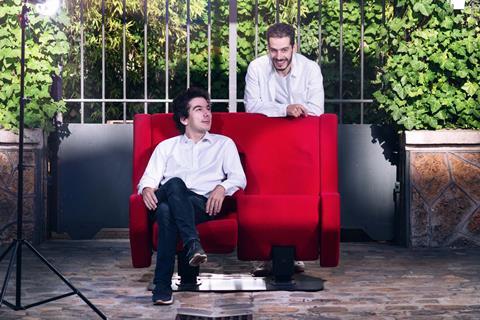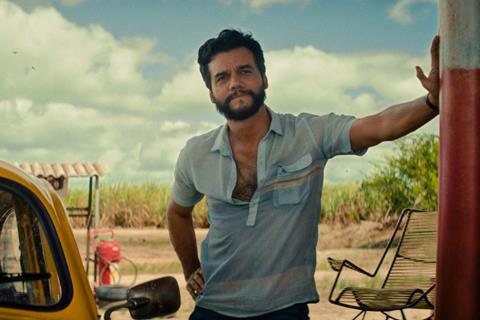
Along with Neon and Mubi, the company that seemed to dominate this year’s Cannes Film Festival was mk2 Films.
It arrived with six films in Competition — the most of any company this year — and departed with six prizes for five of its films from the Juliette Binoche-led jury, including the Palme d’Or (the company’s seventh) for Jafar Panahi’s It Was Just An Accident. Other top awards went to: Joachim Trier’s Sentimental Value (grand prize), Kleber Mendonca Filho’s The Secret Agent (best director and best actor for Wagner Moura), Mascha Schilinski’s Sound Of Falling (jury prize) and Hafsia Herzi’s The Little Sister (best actress for Nadia Melliti).
It was a statement-making festival for the family-run independent French film studio, which has had a long-time presence at Cannes, but this year achieved a record haul. With its six Competition titles (also including Carla Simon’s Romería), it is approaching 100 feature selections at Cannes (currently at 97, it’s sure to surpass that benchmark next year).
Politically charged themes — from oppression in Iran and Brazil to queer Muslim identity — powered its 2025 Competition slate, but that’s nothing new for mk2, which was founded in 1974 by Marin Karmitz precisely because he was having trouble finding distributors and cinema operators to show audiences his more audacious titles. More than half a century later, the 51-year-old company has been passed down to the founder’s sons, Nathanaël and Elisha Karmitz, who took the reins in 2005 and serve as co-CEOs.
Mk2 has grown from three small screens in Paris to an international exhibition, production and sales empire, complete with a catalogue of some 1,250 titles, 24 cinemas in France and Spain, and 450 global employees, not to mention 14 Oscars and 152 prizes at international festivals. It is one of the few global companies to have cracked the code of how to simultaneously win over critics, festival juries and awards voters, and also connect with audiences, as it continues to evolve with the times.
The company is divided into five major divisions: film production, financing and sales arm mk2 Films; cinema chain mk2 Cinemas; advertising agency and creative studio mk2+; publishing house mk2 Editions; and mk2 Innovation, an incubator for the future of cinema.
While its reach is vast, its company values remain simple, adhering to three main pillars: transmission from one generation to the next; “altérité” (which translates loosely to “otherness” or “difference”); and selection — “we aim to be a filter for the best films”, says Elisha. Its tagline in France is “une autre idée du cinéma” or “another idea of cinema” — an apt description for a company that has always done things differently.
Mk2 is the biggest arthouse cinema network in France, with 13 cinemas, and the third largest in Spain with 11. Its cinemas house restaurants, cafés and shops, and the group has also invested in hotels, including the first-ever ‘cinema-hotel’, the Hotel Paradiso in Paris’ 12th arrondissement. Renovations at another hotel are underway and a cinema museum is due to open at the end of next year.
Mk2 Films’ scope includes producing, co-producing and distributing films, with an international sales division led by Ireland-born, Paris-based Fionnuala Jamison since 2012. The company now takes on some 15-20 films per year in a production, financing or sales capacity, often offering all-in-one packages as it continues to position itself as a one-stop-shop for auteurs with ambitious projects.
“We are always on the edge of what is mainstream,” says Elisha. “We are the bridge between unconventional auteurs and audiences. There are so many artists we have helped to launch at smaller festival sidebars who go on to become icons of pop culture.”
He cites some of the company’s “long-term relationships”, including with Xavier Dolan, Miranda July, Yorgos Lanthimos and Justine Triet, which he says are “based on trust, not contracts”.
While other sizeable French film empires like Pathé, Gaumont, UGC/TF1 Studio and SND/M6 all juggle distribution, production and international sales, mk2 has streamlined to become simultaneously larger in scale yet smaller in scope. It stopped distributing films in 2012 as it pivoted to focusing on international film sales, financing and production.
“Our focus is on cinema,” says Nathanaël. “Not entertainment, not media — cinema. A decade ago, we stopped distributing films and everyone said, ‘You’re crazy, you’re ending the company’s heritage.’ But we had a strategic vision, and it is working.”
With films topping the pecking order in its self-described “pyramid” of activities, the company defines itself by people and places — the filmmakers whose work it champions, audiences and the company’s own employees, as well as its cinemas, hotels and the soon-to-open museum in Paris. Owning physical locations is key to the mk2 strategy.
“They are spaces to connect audiences with filmmakers directly, which is crucial,” suggests Nathanaël. “We aim to strike a balance between forging relationships with creatives and allowing them to turn their ideas into reality, but also satisfy the wants and needs of audiences. For all of the film industry’s internal debates about how to attract audiences, they often forget the actual audiences.”
Elisha adds: “We know our audiences, we see them every day in our movie theatres and keep up with them when they leave. Festival awards are great but, even more importantly, our films are selling tickets and selling to other countries. It has to be about finding audiences; otherwise, these awards are futile.”
The Karmitz sons have been integrating technological innovations into the company’s strategy since taking the reins two decades ago. Mk2 became the first fully digital cinema network in France in 2009, the year that its Paris cinema, mk2 Bibliothèque, generated the most admissions for Avatar in France.
“Everything that we do is a balancing act between the past and the future,” says Nathanaël.
Youth appeal

Part of that means also experimenting with innovative ways to leverage new technology and attract new and younger audiences to its cinemas. Among these are mk2 Curiosity, a video-on-demand platform launched in 2020 that offers a selection of free films every week; alternative programming division mk2.Alt, which launched in April 2024 as part of its mk2 Cine-Club collaboration with YouTube; and the launch of an AI festival that will hold its second edition this year.
Last September, mk2 premiered popular YouTuber inoxtag’s documentary Kaizen: 1 Year To Climb Everest!, an event-cinema release that sold 368,000 tickets in 24 hours. In June, it held its annual Cinema Paradiso, an outdoor cinema festival that takes over the main square of the Louvre for free screenings of films, concerts and DJ sets. Famous faces who attended this year included Sofia Coppola, Juliette Binoche and The Secret Agent star Moura.
As well as looking to the future, the company keeps a foot in the past with heritage titles and restorations. It recently acquired the catalogues of Jacques Rozier, Raoul Peck and Marcel Pagnol, adding to its vast collection of auteurs, which include Francois Truffaut, David Lynch, Agnès Varda, Jacques Demy, Abbas Kiarostami, Krzysztof Kieślowski, Buster Keaton, Claude Chabrol, Michael Haneke and Stan Laurel.
This year has seen theatrical re-releases for mk2 library titles including Robert Bresson’s Four Nights Of A Dreamer, Niki de Saint Phalle’s A Dream Longer Than The Night, Varda’s Vagabond and Claude Lanzmann’s Shoah. After the restored version’s premiere in Cannes Classics in May, it also launched a worldwide re-release of Charlie Chaplin’s The Gold Rush on June 26, exactly 100 years to the day since the silent-film classic’s original premiere at the Egyptian Theatre in Los Angeles, with more than 500 screenings in 70-plus territories via local distributors.
International growth
Part of mk2’s foray into the future has been a noticeable shift in its international strategy. While the company’s English-language slate has markedly expanded, Nathanaël suggests: “We’ve always been international by nature. We’re physically based in Paris, but 70% of our revenue is from international activities and we’ve always worked with filmmakers from all over the world. It’s been in our blood since the company was founded.”
He expects that percentage will rise to 80% by 2027. Revenue from global operations has increased since the acquisition of Spanish cinema chain Cinesur in 2014, and the company’s robust expansion into foreign film production and sales has, according to the Karmitzes, been less an aggressive attempt to extend its footprint overseas and more a response to the evolving needs of the global film industry.
“Our international films are important to us because they are important for cinema globally, and for movie theatres,” says Nathanaël. “Since Covid, in particular, what is missing from the market is English-language arthouse films. The US system is no longer capable of financing such films, so there is a real opportunity here in France, in Europe. There is a need for these films, so we are trying to fill that gap.”
Elisha adds: “Our slate remains focused on some 15 films per year — we’re not changing the number but we are shifting the balance a bit.”
In particular, the company has been making more English-language films, culminating in a multi-year financing deal with investment fund manager IPR.VC that was announced last autumn. “Our aim is to provide tools for people to think for themselves,” says Elisha. “In this complicated world, we are a home for freedom, a place that gives different voices the means to contribute their visions to the world. A fund like IPR.VC allows us to grow and guarantees our independence to continue this mission.”
The financial boost from the Helsinki- and London-based investment firm, which has raised more than $200m and backed more than 50 film and TV productions, has allowed mk2 to fast-track its English-language productions and acquisitions, and further boost its international portfolio.
“The fund has enabled us to come onto projects we could not have before, either because they require sizeable investments or because they are smaller-budget films like debut features, with no recognisable cast, that could not rely on pre-sales,” says Jamison, who has been key to the company’s strategy of seeing international projects through from start to finish since she joined in 2012.
Upcoming titles include Kent Jones’ drama Late Fame, starring Willem Dafoe and Greta Lee, which world premieres in Venice Horizons; the Zellner brothers’ alien invasion comedy Alpha Gang, starring Cate Blanchett; Andrew Haigh’s true crime feature Belly Of The Beast, starring Ben Stiller and Colin Farrell; and James Ponsoldt’s psychological thriller Sponsor, starring Jason Segel.
Mk2 is also backing a number of directorial debuts, such as Michael Cera’s absurdist comedy Love Is Not The Answer, with Pamela Anderson, Steve Coogan and Jamie Dornan, Cody Fern’s sibling saga Mother Courage, starring Sarah Paulson and Toni Collette, and Flora Birnbaum’s Self Help, starring Kirsten Dunst.
“We’re not just selling films, we see ourselves as partners who can help to compensate for what is an industry-wide funding crisis,” says Nathanaël. “We structure financing, we assist with the script and editing process, we support the films with key marketing and press strategies, and accompany them to festivals and, on occasion, on awards season tours leading up to the Oscars.”
Adds Jamison: “We handle the creative side and financing and sales. Our intention is not to be on-the-ground producers.” The company does, however, aim to sell all of the films it is involved with on the production side. “We act like a studio in that we can offer films a complete financing model,” she says.
Mk2 remains a fully independent company and its global expansion coincides with similar moves by other France-based media powerhouses, such as Mediawan, Studiocanal and Pathé — although the Karmitzes insist they aren’t in competition. “We spend more time working to surround ourselves with the best partners and do not define ourselves by our competitors,” says Elisha. “The question for us is, ‘Who are our partners in innovation and in defending auteur cinema?’”
As far as partners go, Neon has emerged as a key relationship. It started with Céline Sciamma’s Cannes Competition entry Portrait Of A Lady On Fire, which won the screenplay prize in Cannes and went on to secure a host of critics’ group awards, as well as a Bafta Film Award nomination for best film not in the English language. In a heated contest, Neon landed the North America rights (with Hulu) to the film following its Cannes 2019 premiere.
Since then, Neon has gone on to acquire the North America rights to several mk2-sold films, including Triet’s Oscar-winning Anatomy Of A Fall and Joachim Trier’s Oscar-nominated The Worst Person In The World. While many of mk2’s Cannes 2025 titles have also been sold to Neon, including It Was Just An Accident, The Secret Agent and Sentimental Value, Jamison insists, “there is no official first-look [deal]”, but cites the two companies’ “great relationship that dates back to Portrait Of A Lady On Fire”.
“We have been through incredible highs and hardcore lows together,” she adds, citing both the critical and commercial success of Triet’s Anatomy Of A Fall — as well as its failure to be selected as France’s Oscars submission in the best international feature category.
Also key to mk2’s foray into English-language fare has been the appointment of former Studiocanal and Protagonist Pictures executive Vanessa Saal as consultant and UK lead earlier this year, tasked with expanding co-productions and acquisitions for primarily English-language films. Since Saal came on, “the size of the slate has grown from some six to eight films per year, to now upwards of 15”, says Jamison. “It increases the odds of successful titles.”
On its upcoming slate, mk2 Films’ production arm, MK Productions, is acting as both co-producer and international sales agent for Russian filmmaker Andrey Zvyagintsev’s Minotaur, alongside Charles Gillibert’s CG Cinéma, and Kornél Mundruczo’s The Revolution According To Kamo. Adding to its prestige palette is Marie Kreutzer’s Gentle Monster, a project that is being produced under the multi-year slate financing deal with IPR.VC and won Cannes’ Marché du Film’s Investors Circle prize in May.
Keeping busy

Following this year’s Cannes success, the company heads into the fall film festival season with a lighter but still busy slate. At Venice, as well as Late Fame, it has Laura Poitras and Mark Obenhaus’ documentary Cover-Up out of competition and Shangjun Cai’s The Sun Rises On Us All in Competition. At TIFF, Annemarie Jacir’s Palestine 36 will premiere as a Gala screening and the festival has also programmed all of mk2’s Cannes Competition slate. Several of these titles will then head to New York Film Festival.
Although its executives insist the company doesn’t have a specific editorial strategy, it is looking for auteur-driven projects only. “It’s an industry of prototypes, there are no rules,” says Nathanaël. “We look at the director and the quality of each singular project. Then, since every director and project is different, we adapt our participation based on each project.
“We function more like a book publisher,” he adds. “We are interested in auteurs and the stories they want to tell.”
Jamison concurs: “It has to be auteur-driven. And something that feels new and different, whether in form or subject, the way the story is told or what it is talking about.”
While Jamison says the market is “still healthy”, she adds, “It’s more and more polarised. There are certain kinds of films that won’t be able to find their way anymore. Today, a film has to be unique, distinct, something no one has seen before. There is less and less room for smaller, more fragile films.”
Jamison, Nathanaël and their teams approach every project that comes their way with a made-to-measure approach, she says, meeting weekly to assess each project and decide whether or not mk2 will opt in and, if so, in what capacity. Elisha cites the importance of a film’s form: “It’s not just about what stories they are telling, but how they are telling them. How does their way of making films play a role in film history?”
For example, mk2 is producing the upcoming debut feature from Raphael Frydman, whose short, La Vie Quand T’ai Mort, won the top prize at last year’s inaugural mk2 AI Film Festival. While details on the plot and production partners have yet to be unveiled, the film, says Nathanaël, “will demonstrate how AI can be used narratively and show how this film could not have been made without it”.
He adds: “AI allows auteurs to push their creative limits using new techniques, in the same way as Abbas Kiarostami was able to film Ten in a car, and continuously, thanks to the invention of the digital camera. It was a pivotal film because it wasn’t possible before, much like AI today.”
For foreign producers looking to enter the fray, the company is looking for projects preferably with a director and script attached. “For us, there is no limit in terms of genre, geography, style or budget,” says Nathanaël. “We’re looking for good directors and good films — it’s simple.
“Our only strategy is to be a company in service of auteurs,” he adds. “Our values haven’t changed and they won’t. Our vision is still political: that culture should be a source of freedom. And the strategy changes because we adapt to the world in which we live. That’s why we’re still here.”
















![[L-R]: Amanda Villavieja, Laia Casanovas, Yasmina Praderas](https://d1nslcd7m2225b.cloudfront.net/Pictures/274x183/6/4/1/1471641_pxl_20251224_103354743_618426_crop.jpg)








No comments yet